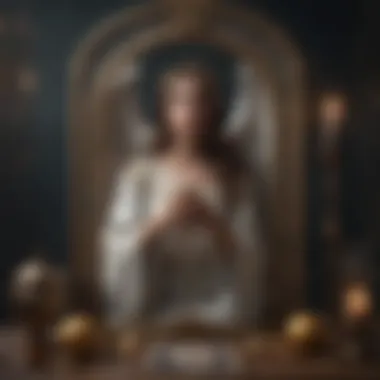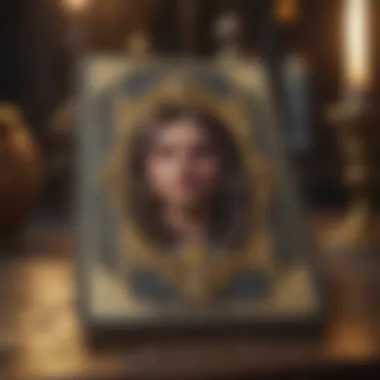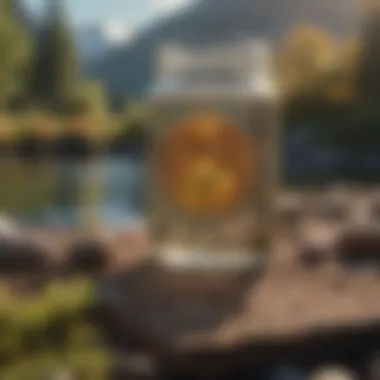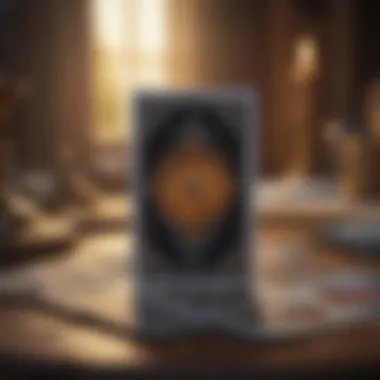Decoding the Symbolism of the Judgment Tarot Card


Intro
The Judgment Tarot card holds a significant place within the Tarot deck. It symbolizes reflection, reckoning, and renewal. This card urges querents to examine their past actions, assess their current state, and consider necessary transformations. As a tool for personal growth, the Judgment card can illuminate pathways and transitions that may need to be addressed. Whether one is a novice or an experienced reader, understanding this card's nuances can enrich Tarot readings.
Characteristics of Each Zodiac Sign
While the Judgment card itself does not directly associate with the zodiac signs, understanding astrological traits enhances one’s perspective when interpreting the card in various contexts. Below are essential personality traits for individual signs:
Overview of personality traits
- Aries: Energetic, pioneering, and bold.
- Taurus: Reliable, patient, and grounded.
- Gemini: Quick-witted, adaptable, and social.
- Cancer: Intuitive, emotional, and nurturing.
- Leo: Charismatic, self-assured, and creative.
- Virgo: Analytical, diligent, and precise.
- Libra: Diplomatic, charming, and fair.
- Scorpio: Intense, passionate, and secretive.
- Sagittarius: Adventurous, optimistic, and freedom-loving.
- Capricorn: Disciplined, ambitious, and responsible.
- Aquarius: Innovative, humanitarian, and independent.
- Pisces: Dreamy, artistic, and compassionate.
Strengths and weaknesses
Each sign carries strengths that can help navigate situations in life, including during times of reflection:
- Aries: Strong initiative but may lack patience.
- Taurus: Stalwart and reliable, yet can become stubborn.
- Gemini: Highly communicative, but sometimes lack depth.
In integrations with the Judgment card, these strengths may reveal aspects of accountability or areas in one’s life that require change.
Compatibility with other signs
Compatibility discussions contribute to personal growth as individuals explore crucial relationships through the lens of the Judgment card. Learn how signs interact in relationships, which can explain certain dynamics within personal circumstances. Understanding between signs may illuminate areas for growth and better judgment in relationships.
How to Interpret Tarot Cards
Understanding the Judgment card can greatly enhance the interpretation of a Tarot reading. Here's an overview of fundamental elements:
Major and Minor Arcana
The Tarot is divided into the Major Arcana, which Includes 22 significant cards such as Judgment, and Minor Arcana that covers the daily nuances of life through four suits.
Meaning of key cards
Key cards often highlight important life themes. In comparison, Judgment signals endings, new beginnings and tapping into inner voices to drive personal accountability and insights.
Sample interpretations in different spreads
- Single card reading: Interpretation focuses on a singular transition or decision.
- Three-card spread: Looks at past, present, and future, revealing how past decisions relate to the current life path.
Overview of deck styles
There are various styles of decks, each interpreting cards differently based on imagery and text. Finding resonance with a deck is crucial for maximizing effectiveness within readings.
Popular decks and their unique features
Some popular decks include:
- The Rider-Waite-Smith: Offers rich imagery that aids intuitive interpretations.
- The Thoth: A complex deck with detailed esoteric themes.
In this way, using unforgettable interpretations assists in personal taboos and insufficiencies while acknowledging areas of growth.
The journey of exploration through the Judgment card leads toward opportunities for renewal and self-discovery.
By integrating thorough symbol deciphering and astrological nuances, both includes personal insight and relationships that require nurturing toward deeper understanding.
Overview of the Tarot
The Tarot deck serves as a profound tool for introspection and guidance within the realm of esoteric studies. Understanding this deck is crucial for comprehending the nuances of individual cards, including the Judgment Tarot card. The Tarot is not just a collection of cards; it embodies complex symbology that reflects deeper psychological concepts and spiritual principles. Each card holds its unique archetype, its meanings intertwining with human experiences.
In this article, we focus on the Tarot's structure and historical context, both essential for fully grasping the significance of the Judgment card. This foundational knowledge allows enthusiasts -- whether novice or experienced -- to analyze readings with greater clarity and insight. By delving into the Tarot's origins and organizational layout, we position ourselves to appreciate the richer meanings of its individual cards.
Historical Context


The history of Tarot can be traced back to 15th century Europe, initially seen as a card game enjoyed by nobility. Over time, it evolved into a tool for divination and self-reflection. The Mamluk cards, brought from the Islamic culture to Europe, share a great resemblance to the Tarot decks that we are familiar with today. Gradually, Tarot developed into a symbol system—a combination of numerical and archetypal influences derived from various esoteric traditions.
Important figures, such as the Hermetic Order of the Golden Dawn, integrated Tarot into their teachings, further establishing its connection to mysticism and psychology. During the 19th and 20th centuries, the Tarot gained recognition that opens up the vast domain of tarotology. Its relevance continues today, adapting to modern interpretations and personal experiences.
Understanding the historical context allows readers and practitioners to discern the journey of this deep framework and connect its past significance to contemporary uses. Thus, the judgment of time and culture highlights how personal interpretations have transformed into collective insights.
Structure of the Tarot Deck
A standard Tarot deck typically consists of 78 cards divided into two main groups: the Major Arcana and the Minor Arcana. The Major Arcana includes 22 cards, starting with The Fool and ending with The World, encapsulating significant life events and spiritual lessons. Each card in this section reflects pivotal moments of transformation, with the Judgment card specifically embodying themes of reflection and renewal.
The Minor Arcana consists of 56 cards, sub-divided into four suits: Wands, Cups, Swords, and Pentacles. These suits explore more everyday experiences and challenges, providing context to the developmental processes depicted within the Major Arcana.
The Tarot deck thus serves as a map of both life’s major sores and minor events, calling attention to the equilibrium of the cosmic journey. Each reading becomes essential for navigating life within the space of introspection, urging realizations appearing within a structured context of symbols.
With this groundwork laid, we await the insights the Judgment card provides when exploring its position in the Major Arcana.
Prelude to the Judgment Card
The Judgment card holds significant meaning in the Tarot deck, acting as a crucial pivot point for both individual introspection and broader life evaluations. In an article that explores its multifaceted nature, it is imperative to comprehend the various roles that this card plays. Not only does it act as a beacon of self-awareness, but it also prompts individuals to reassess their choices and recognize opportunities for rebirth.
Position in the Major Arcana
Within the structure of the Tarot, the Judgment card is the twenty-first card of the Major Arcana. It follows the significant lessons contained in The Hanged Man, which often symbolizes surrender and seeing things from a new perspective. Judgment encapsulates culmination and transformation, marking a decisive moment of reckoning. Its placement signifies the concluding chapter of the Major Arcana cycle, bridging education and enlightenment learned through previous experiences.
In readings, the proximity of Judgment to other cards can greatly influence interpretations. For instance, it can indicate a significant life phase change or provide clarity regarding past decisions, urging individuals to confront the outcomes with mindfulness and disclosure.
Imagery and Symbolism
The imagery in the Judgment card is rich and multilayered, serving as a window into its deeper meanings. Common representations include an angel, often thought of as Gabriel, blowing a trumpet. Below, figures rise from their graves, symbolizing awakening and rebirth. This imagery captures the essence of reassessment and confronting one’s past.
To breakdown the symbols:
- Angel: Represents divine guidance, heralding a call to individuals for reflection.
- Trumpet: Acts as a clarion call, symbolizing the importance of heeding this call to rebirth and understanding.
- Risen Figures: They embody those who consider or seek regeneration, reflecting the individual human experience of confronting past actions and choices.
Ultimately, the imagery on the Judgment card signifies a life-altering realization, a moment drenched in self-clarity, while speaking to the possibility of redemption and the continual flow of growth in human experience.
Symbolism of the Judgment Tarot Card
The Symbolism of the Judgment Tarot Card is fundamental to grasping its implications in interpretations and readings. This card represents a turning point, where an individual confronts their past actions, questions deeper aspects of their existence, and inevitably faces renewal. Understanding its symbolism is significant not only in Tarot readings but also in psychological and spiritual reflections, bridging personal growth and life choices.
Key Symbols Explained
The Judgment card features several vital symbols that contribute to its narrative and meaning.
- Angel with Trumpet: This is perhaps the most compelling aspect of the card. The angel represents a divine call for awakening. The trumpet's sound emphasizes the multifaceted impact of judgment—be it as an alarm bringing attention to needed transformations or as encouragement to proceed with clarity during significant moments of reflection.
- Risen Figures: They symbolize the revival of the self. The figures illustrate people rising from graves, denoting rebirth, accountability, and acknowledgment. This is an admission of both life and potential transformation.
- Water: It often symbolizes the subconscious and emotional undercurrent boosted by reflection. Water in this card indicates the cleansing aspect of acceptance and release.
- Cross: A reminder of our spiritual journey and the significance of growth from suffering. It signals making peace with past adversities to advance.
These features blend together to demonstrate a delicate balance between facing judgement and welcoming transformation. If seekers better appreciate the implications of these symbols, they often can uncover more profound insights about themselves and their paths.
Numerological Significance
In numerology, the Judgment card is the 20th card in the Major Arcana. Its numerology illuminates further about its meaning and representation.
- Number 2: The concept of duality arises, where opposites interact. It points to reconciliation as vital for any development process.
- Completion: The number 20 resembles a complete cycle. This indicates an endpoint followed by a fresh start. In doing readings, one sseeing this card might reflect on lessons learned and their effects on present forces shaping their choices.
- Reflection of Self: The emphasis on renewal aligns with the concept in numerology, where cycles influence progressing toward a higher understanding of oneself. This act of self-assessment can both enhance familiarity with strengths and recognize weaknesses.
The interplay between numerological insights and dimensional symbols enhances understanding of judgment as it encourages deep personal inquiries while guiding broader decisions moving ahead. These connections elevate readings, integrating distinct psychological aspects and reflections rooted in universal experiences.
Ultimately, the symbolism within the Judgment Tarot Card offers valuable pathways into personal introspection, allowing the seeker a view deeper into their identity and the life themes shaping their spiritual journeys.
Interpretations of the Judgment Card
The interpretations of the Judgment card in Tarot hold significant weight for anyone delving into the mystical realm of this deck. Conveying the message of transformation and a call to awaken, this card can spark profound reflection. By examining both upright and reversed meanings, practitioners can gain insights about individual paths, collective consciousness, and the cycles of renewal. Understanding these interpretations offers not only clarity but also cultivates personal growth, urging tarotists to think critically about their readings and the messages conveyed by kcards.
Upright Meaning
When the Judgment card appears in the upright position, it encapsulates themes of renewal, evaluation, and revelation. It represents a moment of awakening, where individuals are called to reflect on their past actions and decisions. This card often signifies a time for personal assessments, pushing the individual towards growth and transformation.


Key Aspects of the Upright Judgment:
- Self-Reflection: This card prompts individuals to evaluate their past. What lessons can they draw from previous experiences? Those questions can lead to greater self-awareness.
- Second Chances: Judgment in an upright position suggests the opportunity for revival and stepping into a new phase. It encourages people to release past grievances and embrace potential futures.
- Call to Action: It often signifies the need to engage with major life decisions and act upon insights gained. It's like a wake-up call, prompting individuals to heed their true calling.
This states the importance of taking ownership of one's choices and catalyzes a drive towards change.
Reversed Meaning
When the Judgment card is reversed, it conveys a divergence from its vibrant upright energies. It can indicate lack of self-awareness, stagnation, or even fear of addressing personal faults. At this position, the card can symbolize inner turmoil, self-doubt, or hesitancy to evaluate one's life and decisions critically.
Key Considerations of Reversed Judgment:
- Avoidance of Accountability: It may suggest that an individual is shunning responsibility for their actions. They may find it challenging to face the truths of their past.
- Fear of Change: There may be hesitation to embrace transformation and take necessary action towards improvement. The need to confront difficult realizations becomes weaker here.
- Internal Confusion: Reversed, the card can reflect mixed feelings or conflicts within. People might be disconnected from their inner voice, creating a net of confusion in decision-making.
This card in reverse embodies personal reluctance to explores realities and change.
The interpretations of the Judgment card serve as an essential guide for Tarot readings. They illuminate the multifaceted nature of awakening and the barriers that may hinder growth. By understanding both positions, one can navigate through the complexities of life with heightened clarity and awareness.
Judgment in Tarot Readings
The Judgment card holds significant importance in various Tarot layouts. Understanding its implications can enrich the reading for both the querent and the reader. When Judgment appears during a Tarot reading, it serves as a powerful reminder of the themes of rebirth, accountability, and personal metamorphosis. Encapsulating the essence of reflection and decision-making, this card urges one to assess their past actions and consider how they shape current circumstances and future opportunities.
Contextual Influence
When interpreting Judgment, context is essential. Whether the card arises alongside other Major Arcana or in the company of Minor Arcana changes its messages and emphasizes particular facets. In a reading centered around career progression, the Judgment card may suggest decisive change and a necessary evaluation of one’s career path. The relationship angle may interpret it as a call to reflect on past decisions, laying the groundwork for future choices.
Additionally, environmental elements play a vital role—be they astrological influences, life situations, or emotional states—framing how Judgment is understood.
“The context of the reading gives Judgment its nuanced power, transforming it from a static idea into a dynamic investigation of one’s life.”
As a result, readers must give careful thought to the surrounding cards and the specific question posed, ensuring that the imagery of Judgment is neither misread nor overlooked.
Common Spreads Featuring Judgment
The Judgment card frequently appears in a variety of Tarot spreads. Here are some prevalent layouts where its presence can be particularly influential:
- Celtic Cross: In this complex spread, Judgment may symbolize an emerging awakening, illuminating pivotal issues at the heart of one’s inquiry.
- Three-Card Spread: With each position representing the past, present, and future, finding the Judgment card here can indicate a crucial moment of reckoning regarding past decisions and impending changes.
- Relationship Spread: The card speaks to accountability between partners, suggesting that both should reflect on mutual decisions and their repercussions.
When Judgment appears in these spreads, its role shifts according to the context but uniformly encourages personal reflection and awakening to one's life path changes. By offering guidance through introspection, Judgment emphasizes that renewal often follows an honest confrontation with the self. Its presence demands attention and can lead to significant insights, making it a vital tool in Tarot interpretation.
Judgment and Personal Development
Judgment is not just a card in the Tarot; it is a profound symbol for personal development and growth. Understanding the Judgment card can lead to significant insight about one's journey in life. This aspect is vital for several reasons, including enhanced self-awareness, the willingness to confront personal truths, and the capacity for transformation.
In any reading, the Judgment card emphasizes the importance of reflection and renewal, pushing individuals to assess their past actions and during this scope of evaluation, recognizing the lessons learned. Embracing its message can lead to a deeper understanding of one’s patterns and behaviors, making way for a more intentional future.
Reflection and Self-Assessment
Engaging with the Judgment card invites individuals to embark on reflection and self-assessment. This card systematically calls upon its holders to confront their past, often illuminating ignored aspects of life. The process begins with admitting previous mistakes or successes, and examining how these experiences shape the present.
During this reflective process, honesty comes to the forefront. One may ask questions like:
- What have I learned from my past decisions?
- How does my past influence my present life?
- Am I genuinely aligning my actions with my values?
This self-assessment guided by the Judgment card is not about criticism. Instead, it centers around understanding. It helps identify patterns that require adjustment. The card's upright position often signifies that one is ready to take on this challenge, urging for a renewed approach to previously held beliefs or actions.
Judgment Across Different Cultures
The Judgment Tarot card transcends cultural boundaries. It's important to understand how this card's meanings shift among varying contexts. Identifying these perspectives can offer rich insights into personal experiences and collective consciousness. These interpretations provide depth for tarot readings, making it vital for enthusiasts and practitioners alike to consider diverse cultural frameworks.
Western Interpretations
In Western nations, the Judgment card typically emphasizes concepts of reckoning, self-evaluation, and rebirth. The Christian ethos significantly influences its interpretation, where resurrection serves as a primary symbolism. Many see the imagery of Gabriel blowing a trumpet as an invitation for people to heed the call of self-reflection.
This resonates in many Western Tarot practices. People often view this card as a harbinger of change, but it requires self-assessment and often repents. This conception aligns closely with psychological frameworks that correlate rebirth with therapeutic processes. Furthermore, these interpretations frequently encourage a proactive approach to change, where submitting to a higher authority becomes one avenue for understanding life's challenges.


- Key elements in Western views of the Judgment Card:
- A focus on resurrection to symbolize transformation.
- The understanding that renewal must be initiated by the self.
- The connections to ethics and morality from a Judeo-Christian lens.
Many tarot readers articulate the uplifting aspects, yet there can also be uncertainty. The emphasis on coming to terms with past actions often lurks beneath positive connotations, valuing reflection as crucial for evolution.
Influence of Eastern Traditions
In contrast, Eastern traditions often infuse broader philosophical views into their interpretation of the Judgment card. Cultures that emphasize karma and cyclical nature of life view it less as a moment of judgment and more interwoven with ideas of cause and effect.
Here, the card may signify harmony with one’s actions leading to present circumstances. Personal judgment is less about condemnation and more about alignment with universal laws.
Individuals may connect it with spiritual awakening, viewing personal reflections not just as pertaining to their past lives but also connecting them to something greater.
- Eastern nuances regarding Judgment include:
- Focus on karma and moral consequences.
- Emphasis on spiritual transcendence over static judgment.
- Integration of rebirth in cyclical understandings of life.
It is key to dwell on these cultural narratives when interpreting the card. A Western stance might influence a closed perspective based on guilt and reward, while an Eastern interpretation encourages exploration without singular labels.
Different cultural influences harmoniously bind universal apprehensions of self and fate, allowing diverse interpretations to coalesce into larger meanings.
Being aware of these variations enriches personal and professional tarot practice. The evolutionary liquids of managing what seems static reveal true dynamism in the Judgment card's essence.
Psychological Perspectives on Judgment
The Judgment Tarot card provides valuable insights through a psychological lens. This perspective emphasizes the card's role in awareness, choice, and transformation. For individuals engaging in tarot readings, understanding these psychological implications enhances the reading's depth. It reflects essential human experiences, showing how the Judgment card resonates with personal growth and development.
Archetypal Framework
Understanding Evaluation and morality, the archetypal process of the Judgment card offers multiple interpretations. Carl Jung's theories play a vital role here. His concept of archetypes provides a universal trigger, making Judgment an essential tool in revealing unconscious patterns. This simple yet complex framework guides individuals through decisions that reflect desires and needs.
Jung's archetypal model includes images such as the Trickster, Mother, and Hero. The Judgment card often echoes the theme of the Hero’s journey toward self-realization. Every person faces their “judgment,” an essential confrontation with their aspirations and fears, leading to equitable choices.
- Awareness of one's motives can transform behavior.
- Reflection on past actions can lead to future advancements.
Judgment and the Human Experience
The human experience is rife with challenges that demand reflection and ultimately judgments. The Judgment Tarot card encapsulates this by pushing individuals toward a greater understanding of their journey. In doing so, it signifies liberation from restrictive patterns. This experience concerns revealing hidden truths within oneself.
Through self-assessment, the meanings within the card encourage clarity and acceptance of past misgivings. The struggles faced contribute to a holistic self-knowledge. Here are some benefits tied to engaging with the human side of Judgment:
- Clarity in decision-making
- A deeper awareness of personal choices
- Liberation from cycles of guilt and remorse
Reflecting on past behaviours influence forms of growth. Many who apply the insights of the Judgment card may find paths toward significant changes.
Personal growth arises when individuals confront aspects of themselves, remembering that every choice shapes their narrative. Thus, the significance of Judgment transcends the card itself, becoming a crucial part of not just tarot practice but also emotional and psychological well-being.
The End
The examination of the Judgment Tarot card reveals its crucial role in encouraging self-reflection and personal growth among individuals. The card challenges us to excavate truths within ourselves, which may often lie hidden under layers of complacency or neglect. By embracing its themes of renewal and accountability, one can move toward a posture of empowerment and informed decision-making.
Summarizing Insights
In summary, it is evident that the Judgment card invites us to confront our past. This confrontation is not merely about being critical but understanding experiences to redefine our future. Therefore, highlighting these kernels of wisdom becomes essential:
- Awareness: Recognizing the lessons from past actions forms the basis for making current choices.
- Transformation: Through grappling with these realizations, personal metamorphosis is possible.
- Collective Responsibility: The card suggests that our choices impact not only us but the broader community, calling attention to our roles as active citizens.
Exploring these elements promotes deeper insight into our actions and decisions, ultimately guiding us along a more intuitive and enriched life path.
The Ongoing Relevance of Judgment
Understanding the Judgment card remains pertinent beyond its aesthetic and historical attributes. As society grapples with rapid change—be it technological advancements, social upheaval, or personal crises—the lens of the Judgment card provides a timeless structure for frameworking our experiences.
The essence of the Judgment card in contemporary life encapsulates several foward-thinking ideas:
- Adaptability: It epitomizes the necessity for us to reshape narratives, learn from cyclic events, and recalibrate effectively.
- Moral Compass: It stimulates introspection in an increasingly complex moral landscape.
- Psycho-spiritual Growth: Engaging with the card helps facilitate a holistic view of our maturation process, blending both psychological and spiritual dimensions of being.
The enduring relevance of the Judgment Tarot card highlights our need for both individual insight and shared growth. Its essence bleeds into various spheres of personal and social interaction.
The Judgment card is more than just a tool for divination; it opens doorways to self-awareness that continuously reshape our lives.







